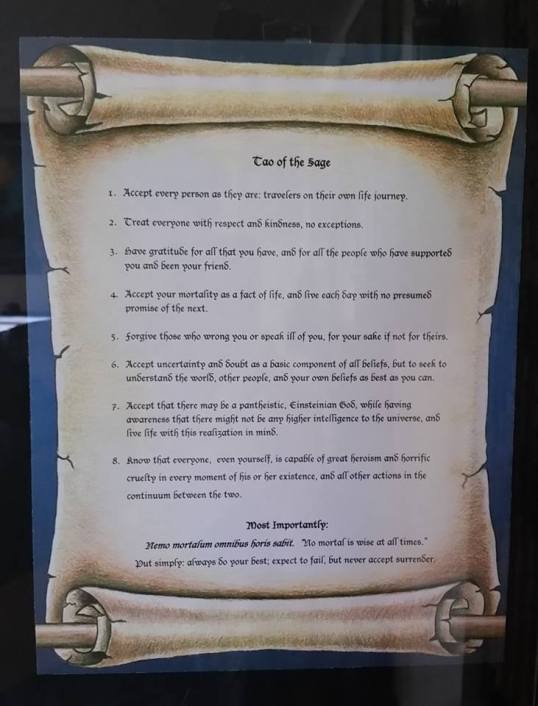I’m listening to Eckhart Tolle’s Power of Now on audiobook. First reaction: what crap. Most of it is just dribble. That’s not to say I don’t agree with a lot of what he is saying, but I think his focus on the rejection of the ego and the self is pure hogwash. He argues that we should abandon our reasoning mind because it is making us unwell. Admittedly, I haven’t finished the book yet. But I have read some poignant criticism of this book on Amazon, and I think many of those critics were on to something.
If you’ve not seen Tolle speak, you should know that he delivers all of his enlightened ideals in a dead-pan voice that we should presume is the result of his spiritual enlightenment. Others claim that he has merely repackaged Buddhism, a point which I see some truth to.
My primary reason for suspecting that Tolle is employing the gray beard fallacy, that is, to surround a bold lie with many truths, is that the mind is an inseparable part of us. It doesn’t need to be rejected. That is not to say that people don’t use the mind in ways which are destructive. Worry and doubt are symptoms of a troubled mind, and achieve no useful end. Some people’s minds are a wasteland: either deluded by cultural and religious dogmas, or beset with psychological compulsions and unhealthy thoughts of self-judgment. He has already refuted Descartes fundamental principle of I think therefore I am as completely the opposite of actual truth. He is clearly not much of a philosopher, though I myself am only a dabbler.
Human reason clearly has merit. Buddha, Krishna, or anyone else has clearly used the mind’s power to arrive at great wisdom. To condemn our logical selves as the source of all our problems is an easy fix for Tolle.
I, however, believe that we are at our core a being of three entities: body, mind, and (perhaps a fundamental force / a spirit perhaps, or maybe something else). I’m not a traditional theist though. I don’t look to religion for truth, but rather as an obstacle to it. I would suspect any theist who didn’t go through a period of serious atheism. To never have wavering belief in this jealous Old Testament God who appears to exhibit symptoms of raging alcoholism is a sign of obedience to dogmatic religion. I completely reject any notion of this kind of God. I’m a pantheist, and I will describe why I think it has merit in another post.
I’m only making a side-point here, because I want to say to atheists reading this that I respect your materialist view that we are merely a mind and a body. That’s fine with me. You need not believe in a force or spirit that animates your consciousness. I readily admit that there is no empirical evidence to support this “force” argument. I will get to that idea in another post.
So, in summary of my reaction to Tolle, I will say again, what horse-shit. He drones on about divorcing yourself from your thinking mind. I think it entirely depends on the kinds of thoughts you have. If your mind is a toxic wasteland of negative emotions and self-judgments, then you may take heart in Tolle’s spiritual ideas. He’s cribbing from a lot of sources to craft his argument, with few ideas of his own, but if you take comfort in his insistence that your thinking mind is the problem, then go for it.
I’m not trashing the idea of meditation, mind you. I agree with Blaise Pascal who observed that, “All men’s miseries derive from not being able to sit in a room alone.” I think we do have to clear our mind of the mundane, day-to-day thoughts that keep us from seeing the bigger picture. We need to think about how precious our life is and what we want to do with it. What will give us happiness on our death-bed at a life well-lived. These things are important. If owning nice things is important to you now, you should question whether those objects will provide you comfort when you see the end coming. I think a strong argument can be made that it’s our human relationships that matter most. Also a dash of a sense of meaningful contribution to humanity. A life well lived in my mind is one that can claim it made the world a better place to be.
It’s clear that most people think merely of material success as their current measuring-stick in determining their accomplishments. But, as the cliché goes, you can’t take it with you. Having children is an easy path to making a difference in someone’s life, since you will have that very special relationship with your life partner and your children. You are a guide for them to deal with the troubles of life such they are. This is not the only path to making a difference, but it’s surely an easy one to initiate. Let’s be honest, too many people rush into starting a family despite the fact that they are awful and irresponsible people, and view their children as possessions as opposed to independent living and thinking beings.
This is sad. It is unfortunate that children, as some of the most powerless members of our society, have to endure so much emotional and physical abuse that they are powerless to stop. I wish there was some way to stop such emotionally violent people from having children, but I know that’s dictatorial. But you can’t really say that the Dutch man who fathered 2 generations of children from his down-syndrome daughter who he kept locked in his basement should’ve ever been allowed to have a single child.
Ok, in purely my fashion, I am digressing and digressing further from those digressions. Let me return to the point of Pascal.
Meditation is a useful exercise, but we all may have different methods that will work best for us. I find that meditation to certain songs and music is best for me. I use songs to set the mood for thoughts that will either inspire me or create emotional states that are peaceful and relaxing. I use internal phrases that trigger certain emotions of oneness with all that is. It’s hard not to sound egocentric in saying this, but I do find that I can attain these blissful states by using certain phrases in my mind to achieve certain neurochemical cock-tails that create a sense of inner peace in me.
You can achieve the same high as you could from any drug once you get the hang of meditation. It does not need assistance from music if that’s not your thing. Here is a good tip which I found useful:
Remembering something from your past creates a direct link to that moment in time in your brain. The emotions you felt during significant events will be recreated in your mind through intense recollection of those events. In fact, your chemical brain doesn’t know the difference between experiencing the event and merely remembering it. Each emotion is a collection of neurotransmitters in various quantities. Those include dopamine, serotonin, gabapentin , norepinephrine, and countless others.
*Offhand, I believe the Pituitary Gland produces these agents. I may be wrong, feel free to correct me in the comments section if I am.
So, here is the point. An easy way to produce joy and relaxing states is to intensely focus in some way on the most positive and joyous moments from your past. As the saying goes, we remember moments, not days. Use your best life experiences as a tool for releasing chemical cock-tails in your brain that made you feel joy in those moments.
This has similar implications for those who dwell on all the negative traumas of their past. In short, don’t do it. You must put that sort of past behind you. It does you no good to wallow in that stuff. As much as the good events, they helped shape who you are today. Accept them for what they are as a part of who you are. As long as you learned something from these experiences, they are not wholly negative. But you must forgive the people who caused these traumas. Not for their sake, but for yours.
Your resentments will hollow you out, and stop you from living fully in the present. The present moment is infinite, it is really all there is. Spend time thinking about it. Hold your body in amazement, as the Baz Luhrmann song goes, “Your body is the greatest instrument you own.” It is entirely yours and it is up to you to decide what to do with it. Will you contribute to the joy of others? Or will you add to their suffering? Will you fight for truth and more equity in society, or will you promote your own success in ways that deprive others of theirs? I think contributing in positive ways will give you more satisfaction as you near your death than selfishness, but that’s just me. Maybe J.P. Morgan got the deluxe suite in the pantheon of Hell, and it’s not so bad. Maybe he even has air-conditioning. . .
I’m joking of course, I don’t believe in Hell. And my view of what’s beyond is mixed with admitted uncertainty because such knowledge is unknowable to we mortals. I will also address my thoughts on that point in a different post. Blog posts must necessarily be short, as the Internet reader is lazier than a book reader.
I will sum up with the importance of reflecting over your life on a nearly daily basis. I can’t recall exactly this next quote, but it’s basically that “in the seat of the human soul it is perpetually 2 AM”. That means that in your inner-core, there is unavoidable uncertainty and doubt about life and its meaning. Though Christians can’t admit it, they do doubt whether Saint Peter will greet them at the Pearly Gates. They suspect in their heart of hearts that maybe nothing happens when they die, and they merely cease to exist. Accept oblivion as a distinct possibility, and live your life accordingly. As Bob Marley said, “If you know what life is worth, you will live your’s on Earth.”
© David Metcalf


